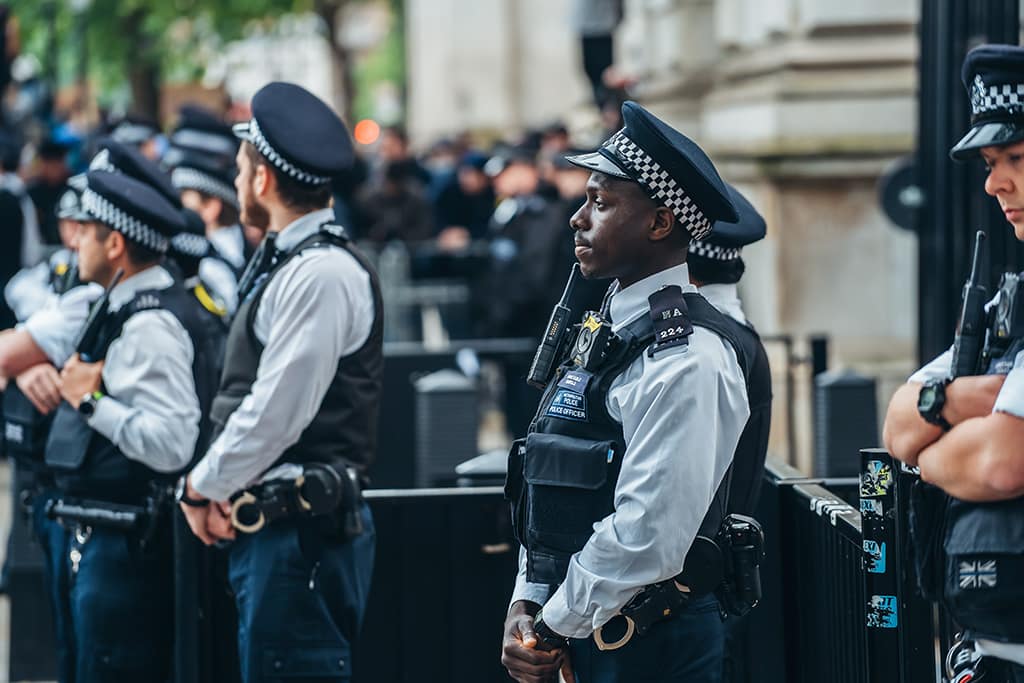Insights
Four trends in online crime we uncovered in our recent policing roundtable
Author
Charlotte Hails
Justice and Policing Lead
Virgin Media O2 Business
6 minutes
08th August 2023
Share this article:
In recent years there’s been a notable changes in the use of digital technology, with more people now working from home and using online platforms for socialising and entertainment.
One side effect of this has been the rise of new vulnerabilities and an acceleration of existing trends in online criminality.
To explore this issue further, we recently brought together nine representatives from different policing bodies around the UK to discuss the changing nature of online crime.
Chaired by Policing Insight and Virgin Media O2 Business, the conversation evolved into four key themes:
- Online crime and related public safety concerns existed before the pandemic, but it shone a spotlight on them.
- The victim impact of these offences can be viewed differently to other 'in person' offences, but the intrusion and impact on feeling safe should not be forgotten.
- Prevention of cyber-crime, fraud, online abuse and other online offences is not just for the police to sort themselves.
- Building a capability so all officers and staff can naturally interact with tech is critical to adapting to the changing nature of crime and ensuring public confidence.
How the Covid-19 Pandemic highlighted existing problems
The challenges of online crime and public safety already existed before the pandemic, but Covid-19 highlighted the need for officers to have the right skills to investigate new types of crime.
Simon Kempton, Treasurer, Police Federation of England and Wales noted the rise specifically in online criminal activities. He said, “How do we safeguard people… when they’re spending more time online? We saw with children that they were at greater risk during the pandemic.
“One thing it did show us, starkly, was the ability of criminals and criminality to adapt quickly. One area we really have to improve, if we’re going to protect the public, is identifying and challenging criminals online.”
DI Hinesh Mehta, Cyber Crime Unit Manager, West Midlands Police also noted that “[The pandemic] created fertile ground for criminals, who knew of some of the vulnerabilities that existed to go and target those providers and gather that information. They would then subsequently leak it or hold it to ransom.”
Martyn Evans, Chair of the Scottish Police Authority noted that “[The pandemic] accelerated a whole range of technologies which are seemingly obvious now”, also explaining that since the pandemic restrictions were lifted, crime levels have risen to where they were before.
The change in victim impact
The victim impact of online offences is sometimes viewed differently to in-person offences.
But the intrusion and impact on victims’ feelings of safety should not be forgotten.
Increased working from home created a lot of opportunities for criminals to target individuals who may not have understood the potential risks.
As Mandy Kauer, Legal Exploitation of Data and Evidence Strategic Lead from the College of Policing pointed out, “through data insights [we’ve noticed that] traditional crimes are moving online”, and “the data that we collect nationally has started to change its patterns of criminality”.
DI Hinesh Mehta explained how the move from on-premises platforms to the cloud created fresh opportunities for tech-savvy criminals to target both businesses – particularly small businesses – and individuals who had transitioned to working from home.
Remote working, he explained, posed new dangers because employees were increasingly using their personal equipment and home internet to access data held by their employers.
Several participants emphasised the importance of early detection and prevention in combating cybercrime.
DI Hinesh continued, “With cybercrime, in some way it’s quite unique in that we can’t arrest our way out of it.
“So, we have to be a bit more thoughtful. The whole prevention issue is pretty big. We need to stop people from becoming victims in the first place. Thankfully, with cyber offences and fraud as well, the education bit becomes really important.”
DI Hinesh also recognised that things are changing, however: “We’ve seen a lot more awareness from the general public about what the dangers are, so things are a little, bit better.”
Prevention is a team game
Prevention of cybercrime, fraud, online abuse, and other online offences is not just for the police to manage, but for other agencies and organisations in collaboration with policing.
Deputy Chief Constable Malcolm Graham of Police Scotland cited inspiration from the public-private collaborations at state level in responding to the challenges posed by cybercrime.
He said, “There needs to be a state-based response. We’ve got a fantastic cyber defence – proactively and reactively in the UK. We’ve got some really good public-private sector collaborations, and we’re in a really good position globally.
“It’s very different for an organisation like policing where we’re used to building our own capability. We can’t do this on our own, we can’t develop the technology on our own – and neither should we seek to.”
DI Hinesh echoed this, “We engage with the public, and we engage with communities, we engage with outreach groups. It’s for us to engage with those groups and educate those people and make that education widespread.
“With public-private partnerships there is a cultural change. And it’s accepting that the skillset doesn’t always sit with policing. There are experts out there who are willing to work with us and assist us.”
The importance of data
It has never been more important to give both front-line officers and staff and specialised units the technological tools to meet these emerging threats head-on.
Deputy Chief Constable Malcolm Graham emphasised the importance of “designing out” online crime and cyber fraud with imaginative technical solutions.
As we move forward, most of these new cyber-offences can be prevented by designing technology that is more secure and less vulnerable to attack.
Detective Superintendent Stan Gilmour noted that the data collected on national criminal patterns is essential for professionals to do their jobs correctly, adding “[unbiased data] brings all systems together and communities together to have the most appropriate support for those individuals and not just a one size fits all approach.”
Adding onto this, Mandy Kauer shared how “awareness of the data can help policing professionals, such as those here today, to do their jobs correctly.”
The roundtable discussion repeatedly highlighted the vital importance of collaboration and prevention when responding to this changing nature of crime.
Huge amounts of data are held in many different systems, and it was highlighted how those legacy systems and infrastructures continue to be an issue for the police.
This is why data sharing between different agencies that work together to keep people safe and how that information is used effectively can't be underestimated. Evidence based policing and how officers share best practice is key.
When we engage with different police forces, we endeavour to join up the dots and keep conversations going around who is leading the way in different areas.
While there is still a great deal of work to be done, police forces across the UK have already made great progress – especially in public awareness and outreach to a host of different stakeholder groups.
Want to know more about trends in online crime and the role of tech in UK policing?
Drop me an email at charlotte.hails@virginmediao2.co.uk
With special thanks to the participants:
- Martyn Evans, Chair of the Scottish Police Authority
- Deputy Chief Constable Malcolm Graham, Police Scotland
- Detective Superintendent Stan Gilmour, Director Thames Valley Violence Reduction Unit
- Simon Kempton, Treasurer, Police Federation of England and Wales
- DI Hinesh Mehta, Cyber Crime Unit Manager, West Midlands Police
- Mandy Kauer, College of Policing, (DPP) Strategic Work Stream Lead: Legal Exploitation of Data and Evidence
- Charlotte Hails, Virgin Media O2 Business – Justice & Policing Lead
- Martin McFadyen, Virgin Media O2 Business – Head of Public Sector
Want to speak to one of the team?
call 0800 064 3790


